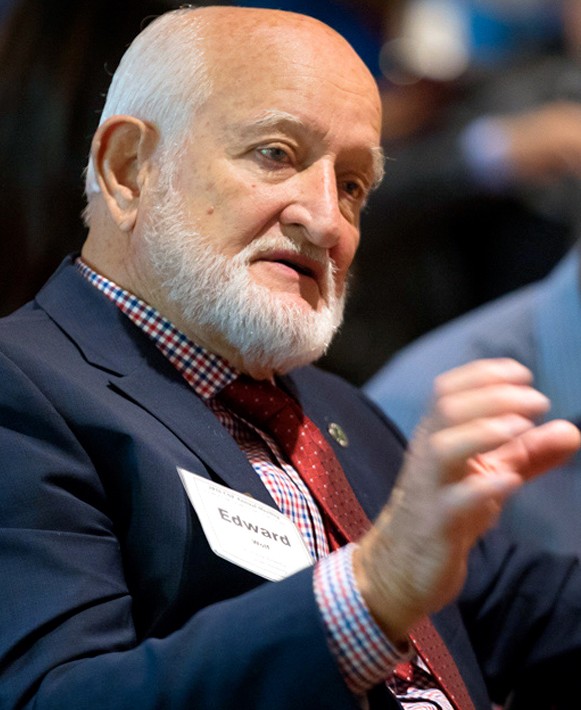Edward Wolf, first Cornell NanoScale Facility director, dies
By Tom Fleischman, Cornell Chronicle
Edward Dean Wolf, a pioneer in nanofabrication who joined Cornell in 1978 as the first director of what would become the Cornell NanoScale Science and Technology Facility (CNF), died March 11 in Ithaca. He was 87.
An emeritus professor of electrical and computer engineering at Cornell Engineering, Wolf is credited with coining the term “biolistic” (biological ballistics), a method for the delivery of nucleic acid to plant cells by high-speed particle bombardment. He also helped invent the biolistic particle delivery system, known as the “gene gun.”
According to current CNF director Christopher Ober, the Francis Norwood Bard Professor of Metallurgical Engineering at Cornell Engineering, Wolf “helped to establish the user-focused culture that remains at the core of CNF’s present operations, and was copied by subsequent user facilities supported by the National Science Foundation.”
“In addition to his tremendous academic accomplishments, Ed was a wonderful human being,” said Greg Galvin, M.S. ’82, Ph.D. ’84, MBA ’93, CEO of Ithaca-based Rheonix and CNF’s associate director from 1984-89. “Ed had friendships with scientists worldwide that endured for decades. It was privilege to have been one of them.”
Born May 30, 1935, near Quinter, Kansas, Wolf received a bachelor’s in chemistry in 1957 from McPherson College, and his Ph.D. in physical chemistry in 1961 from Iowa State University, then did his postdoctoral studies at Princeton University and the University of California, Berkeley.
From 1965-78, Wolf worked as a senior scientist at the Hughes Research Laboratories in Malibu, California, where he led a pioneering research and development group in scanning electron beam surface physics. During that time, he was made a fellow of the Institute of Electrical and Electronic Engineers.
Wolf joined Cornell in 1978 as a tenured professor in the School of Electrical and Computer Engineering, and as the inaugural director of the National Research and Resource Facility for Submicron Structures (NRRFSS), which became the CNF. He oversaw the facility for 10 years, and was responsible for the design and staffing of Knight Laboratory, the NRRFSS’s state-of-the-art cleanroom.
“During the first two years, he jumped into the design and construction of Knight Lab in a very hands-on way, effectively acting as project manager,” said Lynn Rathbun, CNF laboratory manager, who was hired in February 1979, about seven months after Wolf. “He ran around the construction site with an ohmmeter to check that the contractors had properly isolated the rebar, to prevent ground loops. As a result, Knight Lab served us well for 20 years.”
At Cornell, Wolf’s research focused on chemically assisted ion beam etching and on electron and ion beam lithography. In 1983-84, Wolf teamed with plant geneticist John Sanford and engineering lab machinist Nelson Allen as co-inventors of the biolistics gene gun, for genetic transformation using genetically coated, high-velocity microscopic metal particles.
Working on principles similar to a BB gun, the gene gun would blast cells with microprojectiles covered in DNA. Wolf had Allen modify a standard air pistol so that it could accelerate extremely small particles of tungsten into whole onions. According to an account by the National Museum of American History, “Sanford, Wolf, and Allen spent Christmas break 1983 trying out the gun and splattering themselves with exploded onion parts.”
A second and more successful prototype led Wolf and Allen to form Biolistics Inc. in 1986; three years later, they sold the business to DuPont. In 2015, Wolf was inducted as a fellow into the National Academy of Inventors.
During a sabbatical in 1986-87, Wolf was a visiting fellow commoner at Trinity College, and a visiting professor in the Department of Engineering at Cambridge University. He was also a guest professor at Vienna University of Technology in Austria, and visiting scientist at Ion Microfabrication Systems, also in Vienna. He gave numerous guest lectures in Europe, sharing his experiences with others looking to establish nanotechnology centers.
A staunch promoter of entrepreneurship, Wolf retired in 1991 but returned in 1995 to serve for two years as founding director of the Cornell Office for Technology Access and Business Assistance, in the Office of the Vice President for Research.
An avid collector of historical telescopes, Wolf sold his collection – 111 telescopes from 65 makers in eight countries, spanning four centuries – to the Beijing Planetarium in 2016. That same year, he self-published a full-color, 365-page telescope collection book.
“I vividly recall when he invited me into his workshop to see his telescopes,” Rathbun said. “I was expecting to see one or two: Instead, I was greeted by about 50 meticulously restored historical telescopes – polished brass tubes and mahogany tripods from wall to wall, each documented in detail as to its provenance. It was quite impressive.”
A beloved teacher and mentor, Wolf would often invite graduate students to holiday dinners when they were unable to travel home. And his “Club Ed” home on the west shore of Cayuga Lake, which featured nationally recognized dwarf conifer gardens, was a gathering spot for family and friends.
“Ed remained interested in CNF, regularly attending our annual meeting and other events, most recently in October 2022, and was quite proud of CNF and our accomplishments,” Rathbun said. “And likewise, we greatly respected his contributions that made us successful from the start.”
Wolf is survived by his wife of 67 years, Marlene Kay (Simpson) Wolf, as well daughters Julie (Carter) Saline, LeAnn (Dean) Shea and Shelly (Larry) Muray, nine grandchildren and four great-grandchildren. A memorial service will be held in Ithaca at a later date.
Media Contact
Get Cornell news delivered right to your inbox.
Subscribe

